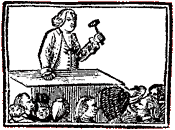Rhode Island’s “vote for raising men”
On 20 April the elite militia company called the Kentish Guards mustered and marched toward Massachusetts.
Before those men reached the border, a message arrived from Gov. Joseph Wanton (shown here), ordering the unit to stand down.
Four members continued on horseback, three of them being Nathanael Greene and his brothers. But once those men heard that the British troops were back inside Boston and the emergency had passed, they went home to Rhode Island to sort things out.
The colony’s first step came quickly. On 22 April the assembly passed an act to raise 1,500 men
properly armed and disciplined, to continue in this colony, as an army of observation, to repel any insult or violence that may be offered to the inhabitants. And also, if it be necessary for the safety and preservation of any of the colonies, to march out of this colony and join and co-operate with the forces of the neighboring colonies.The Massachusetts Provincial Congress had also used the phrase “army of observation” in early April, implying a purely defensive force. Once the fighting began, however, it dropped that phrase entirely. Even as the Rhode Island assembly called its new troops an “army of observation,” it was clearly opening the door to sending those men off to help Massachusetts in its war.
Top officials in the colony resisted. Though Gov. Wanton had been crucial to stymieing the Crown’s Gaspee inquiry a couple of years before, he filed a protest against the legislature’s vote. Deputy Governor Darius Sessions joined him along with two members of the Council of Assistants (the upper house), Thomas Wickes and William Potter. On 25 April they declared their opposition to the new army
Because we are of opinion that such a measure will be attended with the most fatal consequences to our charter privileges, involve the Colony in all the horrors of a civil war, and, as we conceive, is an open violation of the oath of allegiance, which we have severally taken upon our admission into the respective offices we now hold in the Colony.Coincidentally, Rhode Island’s charter called for a new legislative session to start on the first Wednesday of each May. In that spring’s annual election, Sessions, Wickes, and Potter all lost their seats. (Potter would recant and apologize in June, and then return to the Council of Assistants.) Nicholas Cooke became the new deputy governor.
Rhode Island’s freemen reelected Joseph Wanton as governor, but on 2 May he sent a letter to the assembly saying, “indisposition prevents me from meeting you.” Instead he enclosed what Lord Dartmouth, the British Secretary of State, considered a conciliatory offer. Wanton thought that was a more promising route to resolving the crisis. He told the legislators:
The prosperity and happiness of this colony, is founded in its connexion with Great Britain; “for if once we are separated, where shall we find another Britain to supply our loss? Torn from the body to which we are united by religion, liberty, laws and commerce, we must bleed at every vein.”That passage quoted from John Dickinson’s Letters from a Farmer in Pennsylvania. (Some authors miss the quote marks and attribute those words to Wanton himself.)
On 5 May the legislative speaker, Metcalf Bowler, tried to force the governor’s hand. He sent a blank commission for an officer in the new army and asked Wanton whether he would sign such a form. The governor replied:
I cannot comply with it; having heretofore protested against the vote for raising men, as a measure inconsistent with my duty to the King, and repugnant to the true and real interest of this government.At that point the assembly bypassed Gov. Wanton and started treating Nicholas Cooke as the colony’s chief executive. Wanton wouldn’t be officially replaced until November, but he could no longer stand in the way of Rhode Island’s army.
TOMORROW: Finding a general.



